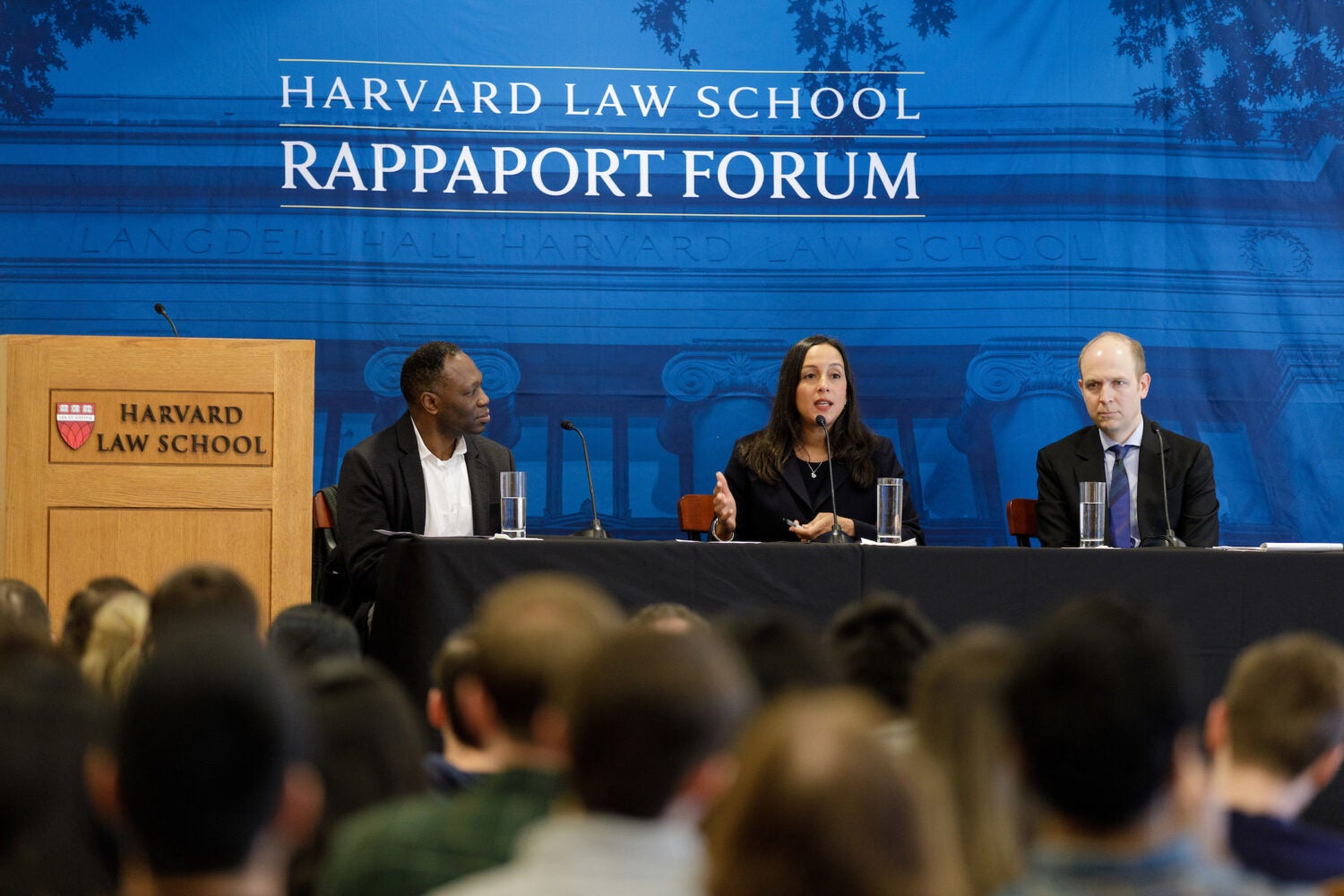Does a “universal injunction” — one that applies beyond the parties to a lawsuit — promote democracy and accountability or thwart it? At the Harvard Law School Rappaport Forum on Wednesday, legal experts debated the history and desirability of the universal — otherwise known as nationwide — injunction.
The discussion, moderated by Guy-Uriel Charles, the Charles J. Ogletree, Jr. Professor of Law at Harvard, featured Sam Bray of Notre Dame Law School and Mila Sohoni ’05 of the University of San Diego School of Law.
Usually, when a court issues an injunction to stop the government from implementing a law, policy, or regulation, the order only applies to the parties included in the lawsuit, explained Charles. But with a universal injunction, even those who have nothing to do with the suit are covered.
Charles added that while universal injunctions have been applied to both Democrat and Republican executives alike — halting key initiatives by the Obama, Trump, and Biden administrations — they remain controversial. “These injunctions are sometimes focused on extremely politically salient topics like the power of administrative agencies, immigration policy, Title IX, LGBTQ+ issues, abortion, et cetera,” he noted.
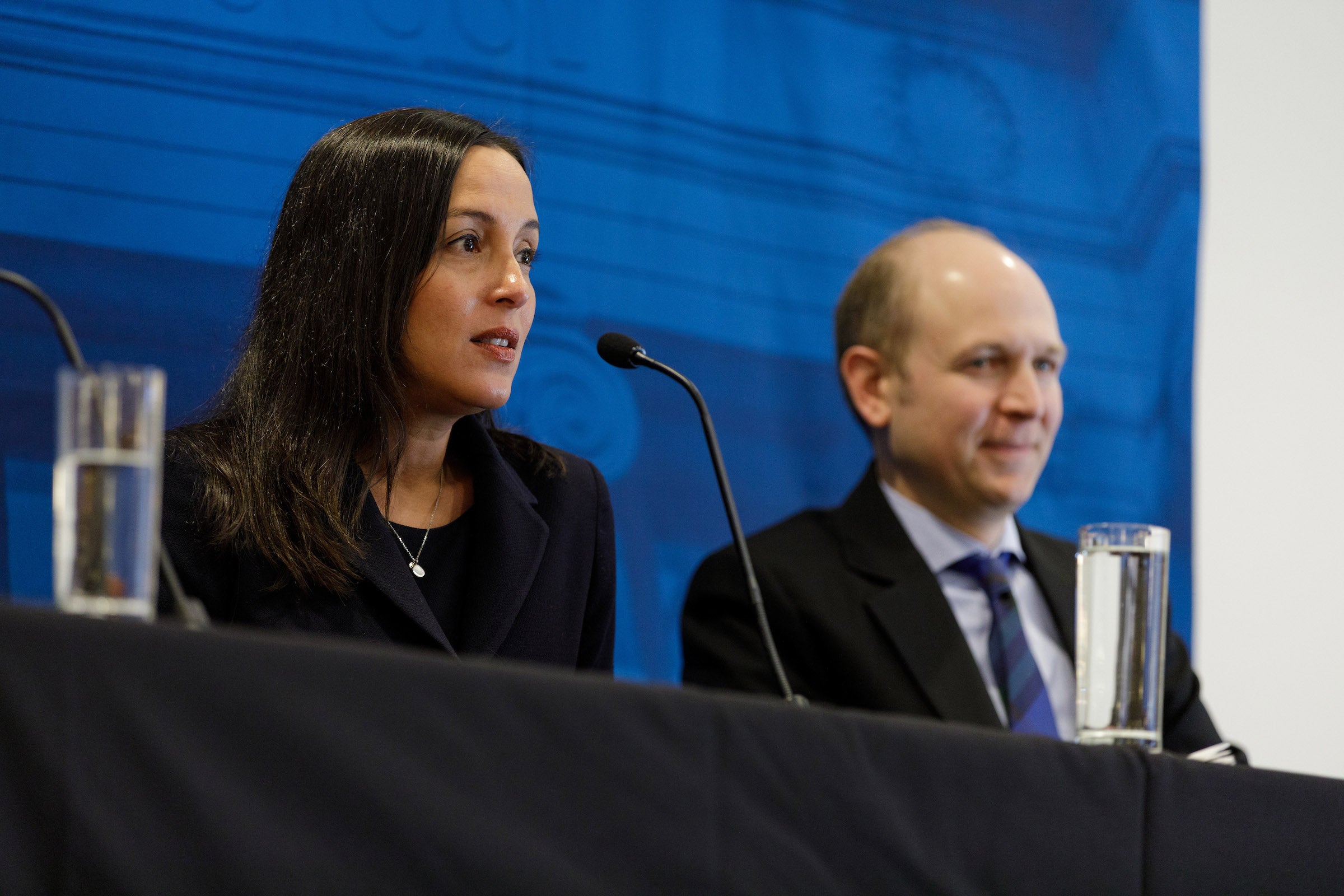
Charles opened the discussion by asking the panelists whether this type of equitable — or nonmonetary — relief is new.
In Sohoni’s view, universal injunctions have considerable roots in the American judicial system. “These were not invented by flower children judges in 1965,” she said. “I think that they date back to roughly the same period of time in which federal courts first started issuing purely plaintiff-protective injunctions against the enforcement of state or federal laws.”
Sohoni buttressed her argument by pointing to history. “In 1913, the Supreme Court issued a nationwide injunction itself. The Supreme Court in the 1920s affirmed universal injunctions against state law. The lower courts in 1920s and the 1930s universally enjoined really consequential federal agency action. I can keep on going through the ‘40s and the ‘50s and the ‘60s.”
What has changed, Sohoni acknowledged, was how frequently this type of relief is employed. “I think it’s true that in the last 20 years or so, there has been an increase in the number of universal injunctions. There was a particularly sharp spike in during the Trump administration.”
“These were not invented by flower children judges in 1965.”
Mila Sohoni ’05
However, to Bray, the historical record is not quite so clear. “History can be read in different ways,” he said. “In my view, national injunctions go back to 1963. And they aren’t before then.”
As an example, Bray pointed to what happened with the hundreds, or even thousands, of lawsuits attacking the New Deal legislation. “The dog that didn’t bark is that nobody asks for national injunctions,” he said. “Nobody does, because nobody thinks they can.”
But, Bray added, “We completely agree that it is fairly peripheral in our judicial politics until you get to recently.”
He identified the second term of Barack Obama — and a universal injunction against some of the former president’s immigration policies — as the “opening of the floodgates.”
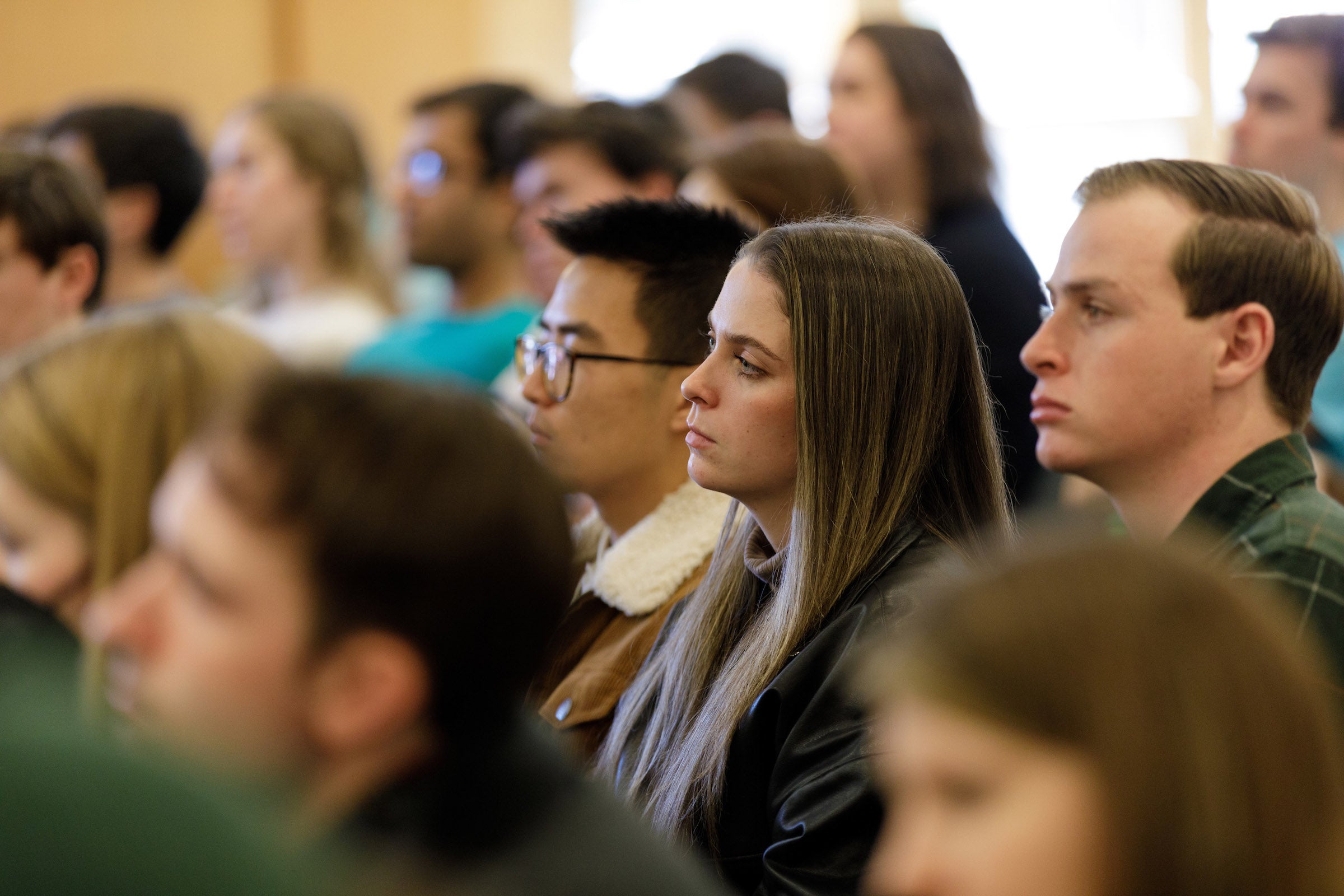
“And since then, almost every major presidential initiative by President Obama or by President Trump or by President Biden has been stopped with a nationwide injunction,” Bray said.
If there has indeed been a spike in universal injunctions in recent years, why might that matter, wondered Charles. “What’s at stake?” he asked.
Nothing less than the meaning of Article III of the Constitution, said Sohoni. “What’s being asserted is that those sources of law impose this crisp rule on federal courts under which federal courts can never grant relief to anybody that’s not a plaintiff or a member of a certified class, which is a mechanism that wasn’t invented until 1966.”
In other words, she said, “This is a central provision of our Constitution, and it should not be lightly cabined. And Congress’s power should not be lightly cabined. So really, what’s at stake here is Congress’s authority to act under the Constitution.”
Bray said that history is instructive for several reasons. One is that “these [remedies] need to be based in equity, they need to have a traditional equitable basis unless they’re authorized by statute,” he said. “And so, if you’re not going to call time in 1789 — and you shouldn’t — you should allow equity to develop as a tradition. Then how it’s developed as a tradition matters, and whether something is well-rooted in that tradition matters.”
“If you go back to the challenges the states brought against the [ACA] … there was no request for a nationwide injunction. Now, if you were bringing that suit, it would sort of be malpractice not to.”
Sam Bray
Another way history matters is in assessing universal injunctions’ coherence with other aspects of the judicial system, said Bray. There are limits on who gets to sue, and how, which can be in tension with this mode of relief. “These include the requirements for class actions, the difficulty of getting virtual representation, the fact that a district court decision has no precedential authority outside that in other courts, even other district courts [or] judges in the same district.”
If universal injunctions don’t have a long past, he continued, if instead “it is something we kind of backed into accidentally and didn’t really ever endorse and have a considered conversation about, until it just gets exploited by red state A.G.s at the end of the Obama administration, then it looks different.”
“Do we have a theoretical conception of how equity ought to evolve and how that fits with the rule of law?” asked Charles.
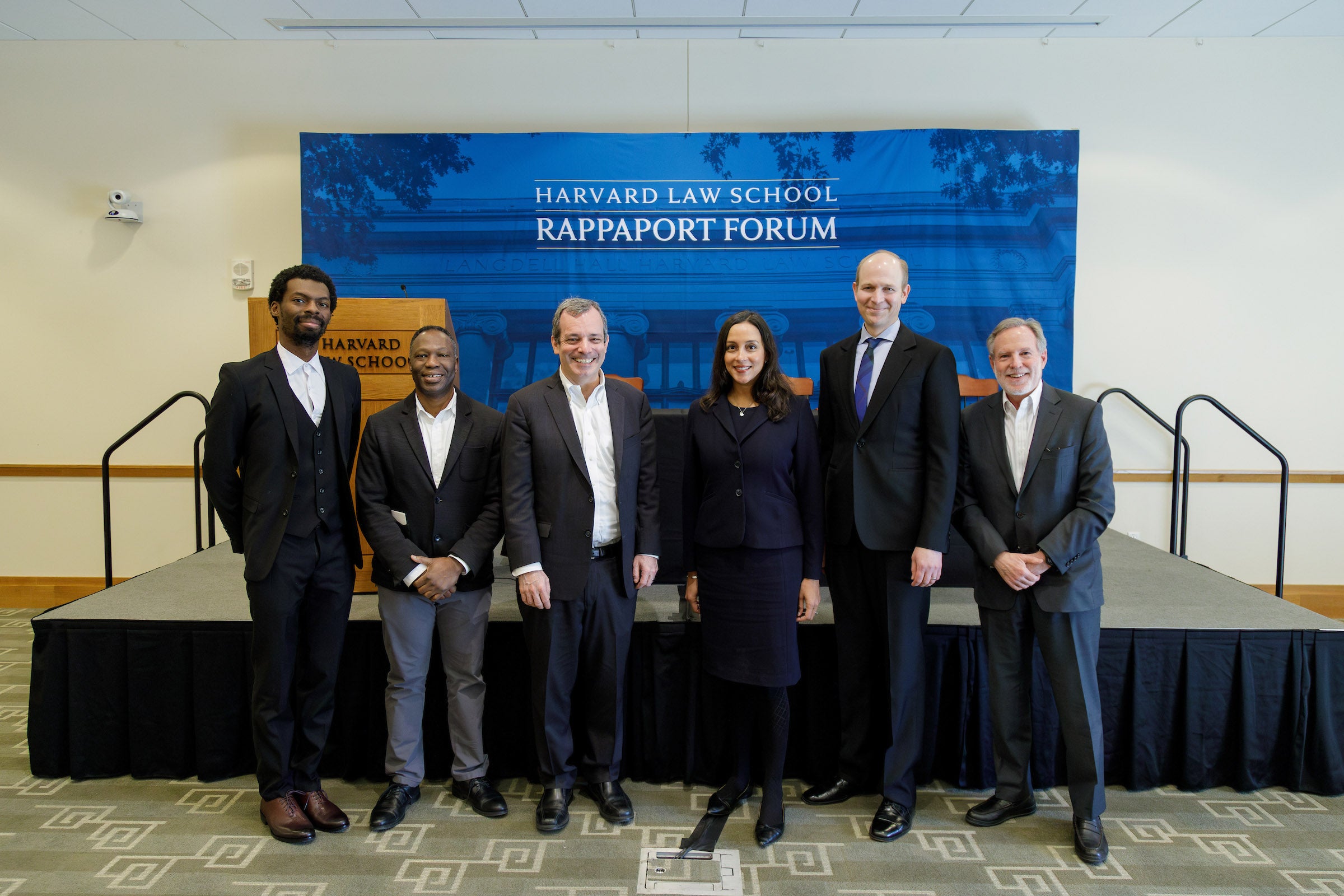
In a court of equity, said Sohoni, there are a few concerns courts should consider. “One of those things is making sure that that the law is applied in a uniform way. The other is making sure that pragmatic and practical solutions are achieved. And another is, in short, ensuring that injunctive relief is properly tailored to the harm that’s being suffered.”
A universal injunction may be critical to ensuring against future violations of the law, Sohoni said. And this mode of relief is not unique, she added, because there are other mechanisms — like joinder or intervention — that courts often deploy to prevent duplicative lawsuits. Like universal injunctions, she added, “They’re designed to make sure that courts do not get overwhelmed by a whole bunch of redundant, weightless lawsuits that could have all been settled at once.”
But Bray worried that just as equitable remedies can affect justice, so too can they cause harm. “The capacity for equity to be perceived as doing injustice, to shift power from democratically elected branches, is always potent.”
To Bray, “One of [the] key aspects of the practice of equity is that you’re resolving the case between the parties.”
Charles then asked the panelists why, in their view, universal injunctions have become more common in recent years.
“In evaluating the pace of change in the rate of the increase,” said Sohoni, “you have got to think about what the baseline level of illegality of the executive branch.”
Beyond that, she said, political polarization and gridlock, along with larger societal forces, are probably partially to blame.
“I think it’s not just a modest uptick, though,” replied Bray. “It’s a huge spike that has reset our judicial politics. If you go back to the challenges the states brought against the Affordable Care Act and the individual mandate, just about 14 years ago, there was no request for a nationwide injunction. Now, if you were bringing that suit, it would sort of be malpractice not to. That’s how quickly things have changed.”
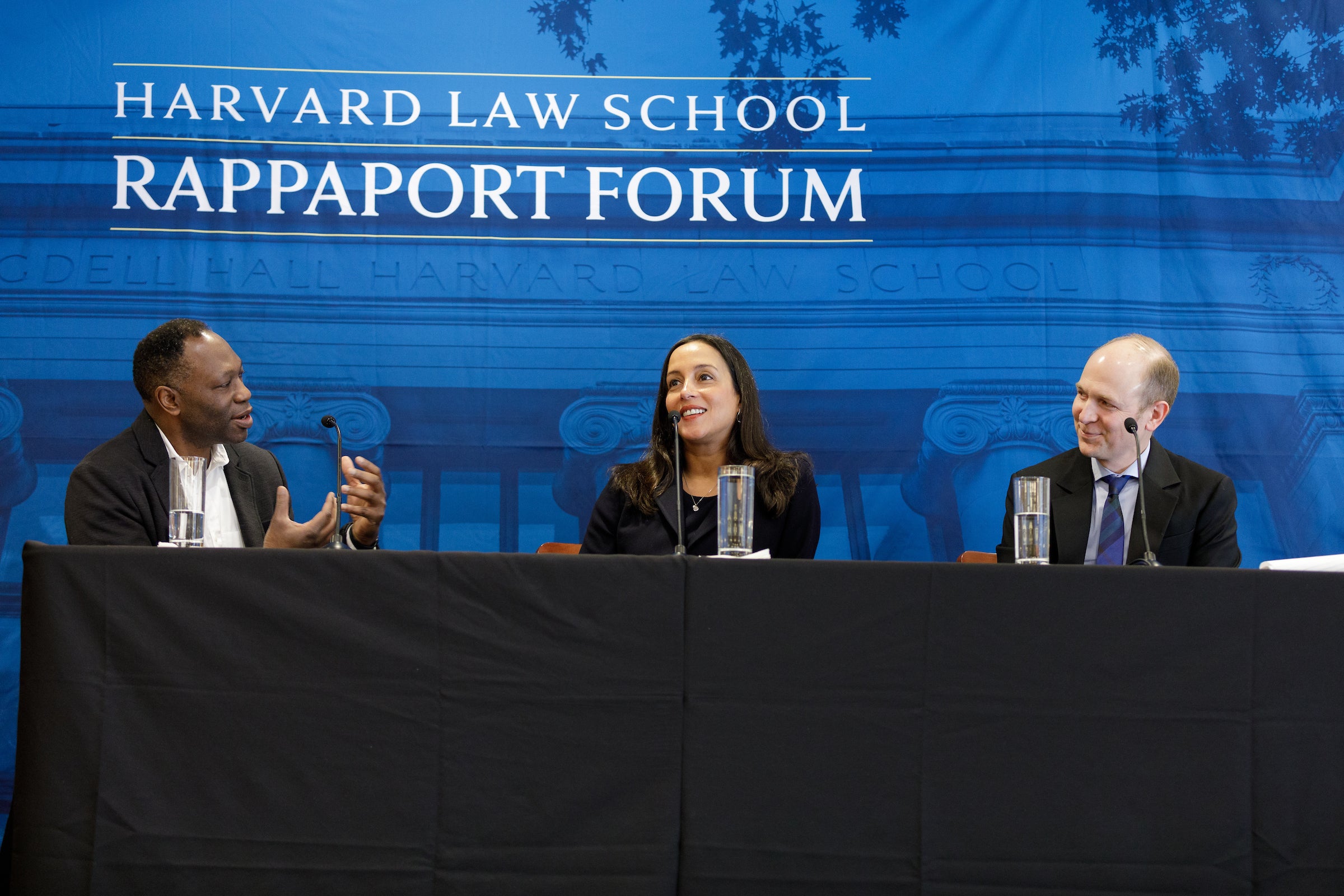
He added that increasingly active state attorneys general and judicial polarization have also played a role in enabling forum shopping — filing a case in a jurisdiction where the court might view it more favorably — for those looking to slap down presidential initiatives.
Sohoni and Bray agreed that the lack of a developed record from lower courts is another reason to be concerned about universal injunctions, at least when they arrive at the nation’s highest court. But the pair differed on whether that was a dealbreaker.
“These injunctions have the potential to depress the amount of percolation that a legal question gets,” Sohoni acknowledged, but also went on to say that she believed that courts do indeed have the power “to give an injunction that wholly pauses a rule universally, that applies nationwide.”
“The Supreme Court is not going to do its best work on an appeal very rapidly from a preliminary injunction from one district court in Texas,” said Bray. “That’s not the posture we want. We want slow, deliberate, conflicting decisions from courts of appeals, and then the Supreme Court gets the circuit split. It takes longer to get there, but we’ll get better results in the end.”
Given all these concerns, are universal injunctions appropriate for our democratic system? Who is the ‘we’ that is implicated, wondered Charles.
“The key ‘we’ here is ‘we the people,’ democratically,” said Bray. “Congress is elected through our democracy. The president is elected through our democracy. Now, our democracy is deeply imperfect. But the democratic pedigree of those two branches is higher than the kind of big shot democratic pedigree of the federal courts.”
“This [remedy] keeps us from doing bad things, it keeps us from doing good things,” he concluded. “But a part of democracy is you do things. … It’s very hard for that to happen if everything the president tries to do get stopped.”
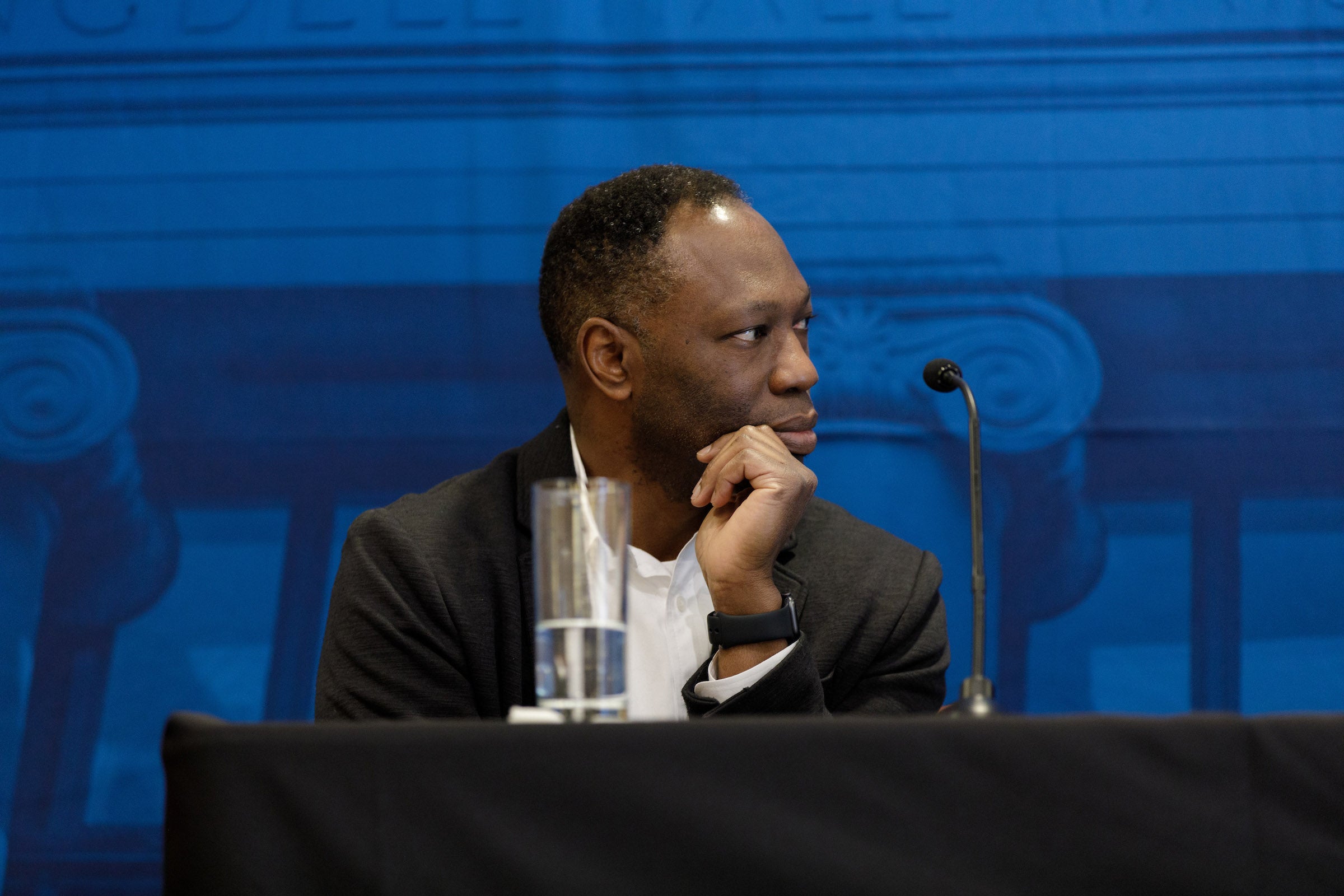
Sohoni saw things differently. “I’m always very suspicious when people start throwing around terms like ‘anti-democratic,’” she said. “You can ask yourselves, were desegregation decrees suppressing democracy, or were they enhancing people’s lives, and in a way that allowed full citizenship to be exercised and flourish and equality to flourish — and democracy to be ultimately strengthened?”
In the end, she said, it’s important to remember that part of what Congress relies on when it empowers agencies to act is that there exists a secure web of judicial checks on that authority. “As [the late Harvard Law Professor Louis] Jaffe said, the existence of judicial review is a necessary condition psychologically, if not logically, of delegation,” she said. “So, I guess I resist any blanket opposition of the judicial power to issue injunctions on the one hand and democracy on the other.”
The Rappaport Forum, a series of dialogues that aim to promote and model rigorous, open, and respectful discussion of important issues, was launched by the late Jerome “Jerry” Rappaport ’49 M.P.A. ’63 and his wife Phyllis.
Want to stay up to date with Harvard Law Today? Sign up for our weekly newsletter.
